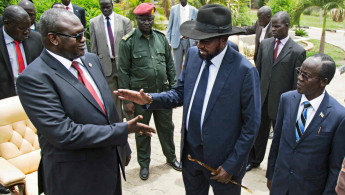South Sudan's Machar 'refuses to sign' peace deal
South Sudan rebel chief Riek Machar refused to sign a final peace deal with the government that aims to end a brutal civil war, a Sudanese mediator said on Tuesday.
"The main South Sudanese opposition groups, including the SPLM-IO (Machar faction), refused to sign the final document demanding that their reservations be guaranteed in it," Sudanese Foreign Minister al-Dierdiry Ahmed told reporters.
The warring South Sudanese parties have held weeks of talks in Khartoum in search of a comprehensive peace deal to end the conflict that has killed tens of thousands of people and displaced millions in the world's youngest country since it erupted in December 2013.
Machar and his arch foe, South Sudanese President Salva Kiir, have already inked several agreements, including a permanent ceasefire and a power-sharing deal, but on Tuesday the rebel leader refused to sign the final document.
"For the first time, the opposition told us that it will not sign," Ahmed said, showing the draft text to reporters and diplomats who had gathered for what was expected to be a preliminary signing ceremony in the Sudanese capital.
"South Sudan will not have peace unless these groups sign."
The Sudanese minister said the opposition's refusal to sign spelled the end of the current Khartoum talks.
"This was the last round of negotiation," Ahmed said, adding that the mediators will submit the final text to the East African regional bloc IGAD which has led the South Sudan peace push.
The accord is to pave the way for a final peace deal and the formation of a transitional government that will hold power until elections are held.
The Agreement on the Resolution of the Conflict in South Sudan (ARCSS) was signed in 2015 to restore peace, but never materialized after Machar was chased out of Juba in an attack by government forces in August 2016.
South Sudan won independence from Sudan in 2011 but descended into war in December 2013 following a power struggle between Kiir and Machar.
Last month, the Security Council slapped an arms embargo and sanctions on two military officials to pile pressure on South Sudan's leaders to turn away from the battleground and seek a diplomatic solution.
The United States, a major backer of South Sudan and top aid donor, has said it has lost patience with the leadership in Juba following a string of failed diplomatic efforts.
Tens of thousands have been killed and nearly four million have been uprooted. Seven million South Sudanese - more than half of the population - are in need of food aid, according to the UN.





 Follow the Middle East's top stories in English at The New Arab on Google News
Follow the Middle East's top stories in English at The New Arab on Google News


![22 Arab countries at COP29 have rejected the targeting of fossil fuels [Getty]](/sites/default/files/styles/image_330x185/public/2024-11/GettyImages-2184289638.jpg?h=199d8c1f&itok=ptHl5bec)